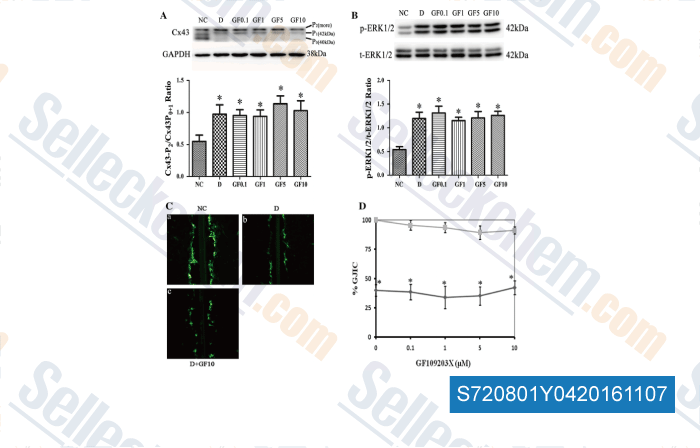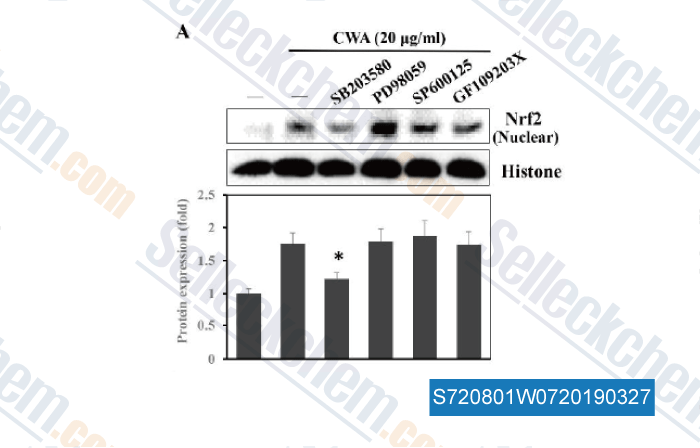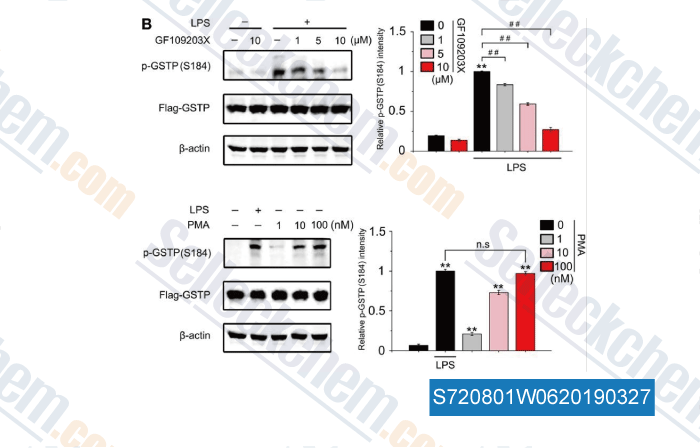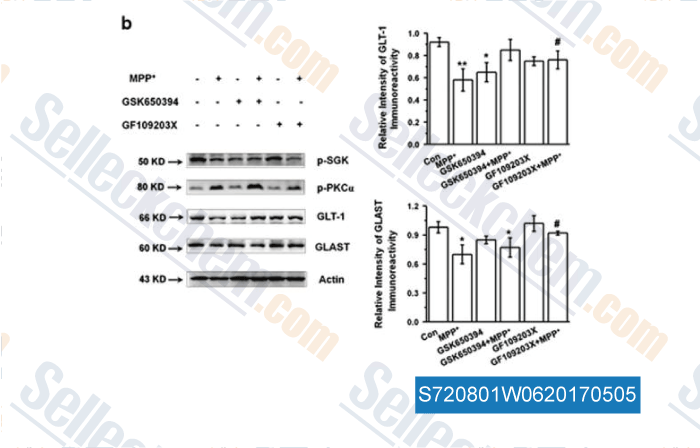|
Toll Free: (877) 796-6397 -- USA and Canada only -- |
Fax: +1-832-582-8590 Orders: +1-832-582-8158 |
Tech Support: +1-832-582-8158 Ext:3 Please provide your Order Number in the email. |
Technical Data
| Formula | C25H24N4O2 |
||||||||||||||
| Molecular Weight | 412.48 | CAS No. | 133052-90-1 | ||||||||||||
| Solubility (25°C)* | In vitro | DMSO | 82 mg/mL (198.79 mM) | ||||||||||||
| Ethanol | 1 mg/mL (2.42 mM) | ||||||||||||||
| Water | Insoluble | ||||||||||||||
| In vivo (Add solvents to the product individually and in order) |
|
||||||||||||||
|
* <1 mg/ml means slightly soluble or insoluble. * Please note that Selleck tests the solubility of all compounds in-house, and the actual solubility may differ slightly from published values. This is normal and is due to slight batch-to-batch variations. * Room temperature shipping (Stability testing shows this product can be shipped without any cooling measures.) |
|||||||||||||||
Preparing Stock Solutions
Biological Activity
| Description | Bisindolylmaleimide I (GF109203X, GO 6850) is a potent PKC inhibitor with IC50 values of 20 nM, 17 nM, 16 nM, and 20 nM for PKCα, PKCβI, PKCβII, and PKCγ in cell-free assays, respectively. This compound shows more than 3000-fold selectivity for PKC as compared to EGFR, PDGFR and insulin receptor. | ||||||||
|---|---|---|---|---|---|---|---|---|---|
| Targets |
|
||||||||
| In vitro | Bisindolylmaleimide I (GF109203X) is an ATP-competitive PKC inhibitor that prevents platelet aggregation induced by stimuli activating PKC, and has potential as a tool for studying PKC involvement in signal transduction pathways. [1] It also produces reversal activity on P-glycoprotein and MRP-mediated multidrug resistance. [2] [3] PKC inhibition by this compound significantly reduces carbachol-stimulated ERK1/2 activation and the subsequent proliferation of SNU-407 colon cancer cells. [4] | ||||||||
| In vivo | Bisindolylmaleimide I (GF109203X) dose-dependently inhibits BK-induced mechanical allodynia in Wistar rats at a dose of 10 μg/mouse (i.pl.). [5] | ||||||||
| Features | Greater selectivity than PKC inhibitor staurosporine. GF109203X is a chemical probe for studying PKC signal transduction pathways. Potential for use in a variety of cancers. |
Protocol (from reference)
| Kinase Assay: |
|
|---|---|
| Cell Assay: |
|
| Animal Study: |
|
References
|
Customer Product Validation

-
, , Mol Cell Biochem, 2015, 400(1-2):213-22.

-
Data from [ , , Free Radic Biol Med, 2018, 129:338-353 ]

-
Data from [ , , Front Immunol, 2018, 9:268 ]

-
Data from [ , , Cell Death Dis, 2017, 8(2):e2574 ]
Selleck's Bisindolylmaleimide I (GF109203X) Has Been Cited by 68 Publications
| Dynamic phosphorylation of Fascin-1 orchestrates microglial phagocytosis and neurological recovery after spinal cord injury [ J Neuroinflammation, 2025, 22(1):121] | PubMed: 40281563 |
| HEP14-activated PKC-ERK1/2 pathway boosts HEP14-empowered hADSCs for ovarian regeneration and functional restoration [ Commun Biol, 2025, 8(1):1267] | PubMed: 40849553 |
| ELK3 destabilization by speckle-type POZ protein suppresses prostate cancer progression and docetaxel resistance [ Cell Death Dis, 2024, 15(4):274] | PubMed: 38632244 |
| Transcription of microRNAs is regulated by developmental signaling pathways and transcription factors [ Front Cell Dev Biol, 2024, 12:1356589] | PubMed: 38721525 |
| Downregulation of PIK3IP1/TrIP on T cells is controlled by TCR signal strength, PKC, and metalloprotease-mediated cleavage [ J Biol Chem, 2024, 300(12):107930] | PubMed: 39454954 |
| Lysine methylation promotes NFAT5 activation and determines temozolomide efficacy in glioblastoma [ Nat Commun, 2023, 14(1):4062] | PubMed: 37429858 |
| Epithelial TNF controls cell differentiation and CFTR activity to maintain intestinal mucin homeostasis [ J Clin Invest, 2023, 10.1172/JCI163591] | PubMed: 37643009 |
| Lysine methylation promotes NFAT5 activation and determines temozolomide efficacy in glioblastoma [ Nat Commun, 2023, 14(1):4062] | PubMed: 37429858 |
| Neurokinin-1 receptor drives PKCɑ-AURKA/N-Myc signaling to facilitate the neuroendocrine progression of prostate cancer [ Cell Death Dis, 2023, 14(6):384] | PubMed: 37385990 |
| Neurokinin-1 receptor drives PKCɑ-AURKA/N-Myc signaling to facilitate the neuroendocrine progression of prostate cancer [ Cell Death Dis, 2023, 14(6):384] | PubMed: 37385990 |
RETURN POLICY
Selleck Chemical’s Unconditional Return Policy ensures a smooth online shopping experience for our customers. If you are in any way unsatisfied with your purchase, you may return any item(s) within 7 days of receiving it. In the event of product quality issues, either protocol related or product related problems, you may return any item(s) within 365 days from the original purchase date. Please follow the instructions below when returning products.
SHIPPING AND STORAGE
Selleck products are transported at room temperature. If you receive the product at room temperature, please rest assured, the Selleck Quality Inspection Department has conducted experiments to verify that the normal temperature placement of one month will not affect the biological activity of powder products. After collecting, please store the product according to the requirements described in the datasheet. Most Selleck products are stable under the recommended conditions.
NOT FOR HUMAN, VETERINARY DIAGNOSTIC OR THERAPEUTIC USE.
